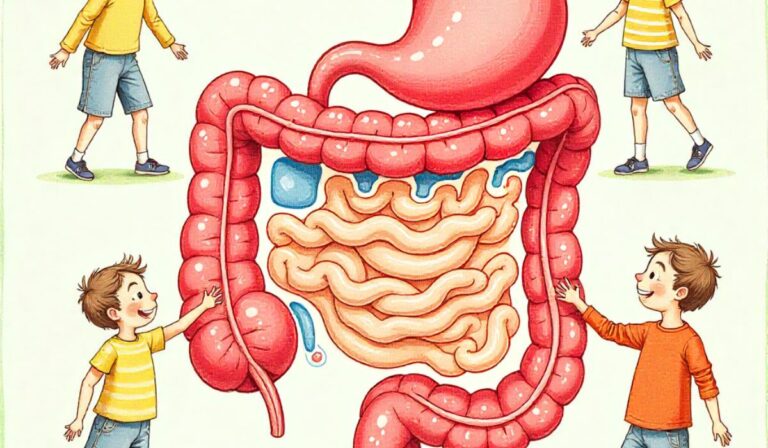Gut Health 2026 Preview: What New Research Suggests
Ever feel like your stomach is a mystery? Maybe you’ve eaten something and felt off, or struggled with bloating and discomfort.
You’re not alone! Millions of people experience problems related to their gut health. This blog post will give you a sneak peek at what future research anticipates.
You’ll explore the exciting possibilities of future studies and how advancements could impact your well-being, providing valuable insight and improving your knowledge of gut health.
Key Takeaways
![Gut Health 2026 Preview What New Research Suggests[1]](https://mycleanseplan.com/wp-content/uploads/2025/10/Gut_Health_2026_Preview__What_New_Research_Suggests1.jpg)
The Future of Gut Health
The field of gut health is rapidly evolving. Scientists are working hard to explore the depths of the human gut and its impact on overall health.
The coming years will bring new insights, technologies, and approaches to help everyone take better care of their digestive system.
This includes everything from new diagnostic tools to customized dietary plans. Let’s explore some of the key areas research will focus on.
Advanced Diagnostic Techniques
One of the most anticipated advancements is in diagnostic techniques. Currently, assessing gut health often involves invasive procedures or less precise methods.
Future innovations promise to change that. New technologies will make it easier to measure what’s happening in your gut.
- Advanced Sequencing: Cutting-edge DNA sequencing will analyze the complete set of microorganisms (the microbiome) in your gut.
DNA sequencing will allow experts to identify all the different types of bacteria, fungi, viruses, and other microbes.
This will provide a detailed picture of the gut environment. Understanding the complete microbiome can help pinpoint imbalances that may cause problems.
- Smart Capsules: Swallowing a tiny, smart capsule will monitor your gut.
These capsules, equipped with sensors, will travel through your digestive tract, collecting data on factors like pH levels, gas production, and inflammation.
The capsule sends the data wirelessly to doctors for review. These can help find things that might be amiss in your digestion.
- Breath Tests: Measuring the gases in your breath can provide clues about what’s happening inside your gut.
These tests can identify conditions like small intestinal bacterial overgrowth (SIBO) and food intolerances. This is a non-invasive and fast way to check on digestion.
- Fecal Analysis 2.0: More in-depth analysis of stool samples will provide a wealth of information about your gut bacteria and overall health.
This will involve advanced techniques to analyze bacteria, metabolites, and immune markers. It offers a comprehensive assessment of the gut environment.
The Gut-Brain Connection
The link between your gut and your brain is a hot topic in research. Scientists are figuring out how these two parts of the body are connected. It looks like the health of your gut can affect your mental state and vice versa. This is known as the “gut-brain axis.”
- Understanding Neurotransmitters: Scientists are studying how the gut impacts the production of neurotransmitters, such as serotonin and dopamine, which affect mood, emotions, and brain function.
A healthy gut can influence these chemicals that are important for your mental health. Research suggests that the gut microbiome can either promote or inhibit the production of these neurotransmitters.
- Impact on Mental Health: Research explores the role of gut bacteria in conditions like anxiety and depression.
Scientists are looking for ways to change the gut microbiome to improve mental health. Studies are exploring the effects of probiotics and dietary changes on conditions like anxiety and depression.
- Gut-Brain Axis and Cognitive Function: Researchers are investigating the effects of gut health on memory, learning, and overall cognitive performance.
This area explores how gut health may impact cognitive functions. For instance, some studies suggest that a healthy gut may support better memory and cognitive performance.
- Future of Therapies: This research may lead to therapies focused on the gut microbiome to treat mental health issues.
This could involve strategies like probiotics, prebiotics, or dietary changes to improve mental health by improving gut health. This also includes new drugs that may target the gut to improve mood and brain function.
Personalized Nutrition
One of the biggest changes that the future holds is more personalized nutrition advice. Instead of general guidelines, people may receive dietary recommendations customized to their unique gut bacteria and health needs. This is a big part of what’s coming.
- Microbiome Testing: More affordable and accessible microbiome testing will allow individuals to learn about their unique gut ecosystem.
This testing gives a comprehensive picture of the specific microbes in your gut. You’ll gain insights into your gut’s strengths and weaknesses.
- Dietary Recommendations: Personalized dietary plans will be based on your gut bacteria and overall health goals.
Your dietary recommendations will be designed to nurture your gut microbes. This will optimize digestive health and promote overall well-being. It will also take into account factors like food sensitivities and metabolic needs.
- Prebiotics and Probiotics: A better understanding of prebiotics and probiotics will guide the use of supplements to support gut health.
This includes knowledge of which strains of bacteria work best for each individual. These will improve the effectiveness of these supplements.
- AI-Driven Nutrition: Artificial intelligence will analyze data to create and modify dietary plans and recommendations.
AI can process a lot of information, from test results to your personal health goals. AI will suggest personalized meals and recommend adjustments over time.
Probiotics and Prebiotics for Gut Support
Probiotics and prebiotics are getting a lot of attention. Researchers are learning more about how they support a healthy gut. These are important ways to improve gut function.
- Probiotic Strain Specificity: The focus shifts to studying specific strains of probiotics and how they affect different health conditions.
Different probiotic strains have different effects. Research will guide you to the right strains based on your needs. This ensures you’re getting the most benefits.
- Prebiotic Fiber Optimization: Research continues on how to best use prebiotic fibers to feed beneficial gut bacteria.
This includes identifying the best types and amounts of prebiotics. This will encourage the growth of helpful bacteria in the gut.
- Combination Therapies: Studying the combination of probiotics, prebiotics, and other substances to enhance gut health.
These combinations are being studied to create the greatest impact. Studies will show which combinations are most effective in promoting a healthy gut microbiome.
- Probiotics for Various Conditions: Scientists are investigating the use of probiotics to address conditions ranging from irritable bowel syndrome (IBS) to mental health.
Research looks into how probiotics can help with specific conditions. This includes how to manage symptoms, prevent flare-ups, and improve the overall quality of life.
Environmental Factors and Gut Health
Your surroundings greatly influence your gut health. This section covers the importance of the environment, diet, and lifestyle choices.
Understanding how these factors interact will allow people to make choices that help create a healthy gut microbiome.
- Dietary Effects: Exploring the impact of different diets on the gut microbiome, from plant-based diets to the Mediterranean diet.
Research examines how different eating patterns alter the composition of the gut bacteria. This helps individuals select food choices. These choices promote diversity and overall gut health.
- Lifestyle Choices: Investigating the influence of exercise, sleep, and stress management on gut health.
These lifestyle practices have a huge impact on the gut’s microbial balance. Studies are showing that regular exercise, good sleep, and stress management can positively influence gut health.
- Exposure to Antibiotics: Research focuses on how antibiotics affect the gut microbiome, including strategies to restore balance.
This includes studying the short- and long-term effects of antibiotic use on gut bacteria. It also explores strategies to restore the microbiome after antibiotic exposure.
- Environmental Toxins: Examining the impact of environmental toxins and pollutants on the gut microbiome.
Studies are helping to determine how exposure to these toxins can affect gut bacteria. This includes how to protect the gut from harm and support its function.
Common Myths Debunked
Myth 1: All Probiotics Are the Same.
The truth is that different probiotic strains have different effects. Some are great for digestion, while others may help with the immune system or mental health. Research is revealing how each strain affects your body.
Myth 2: Eating Yogurt Is Enough to Improve Gut Health.
Yogurt does contain probiotics, but the amount and types can vary. Focusing on a diverse range of probiotics, including those found in fermented foods and supplements, is important. A diverse diet, including plenty of fiber, is also a must.
Myth 3: A High-Fiber Diet is Always Good for Everyone.
While fiber is usually great, some people with certain digestive issues may struggle with high-fiber foods. It’s important to find the right balance for your body and consider consulting with a healthcare professional.
Myth 4: Gut Health Isn’t Related to Mental Health.
This is not true! Research shows a strong connection between your gut and your brain. A healthy gut can positively impact your mood, while an unhealthy gut might contribute to anxiety or depression.
Myth 5: Gut Health Issues Are Just an Inconvenience.
Poor gut health can lead to much more than just discomfort. It can be linked to chronic conditions like diabetes and autoimmune diseases. That’s why it’s so important to focus on keeping your gut healthy.
FAQ Gut Health 2026 Preview
What is the gut microbiome?
A: The gut microbiome is the collection of trillions of microorganisms living in your intestines. These include bacteria, viruses, fungi, and other microbes.
How can I improve my gut health naturally?
A: Eating a diet rich in fiber, fruits, and vegetables; reducing processed foods and sugar; managing stress; getting enough sleep; and exercising regularly can help.
Are probiotics safe for everyone?
A: In most cases, yes. However, some people with certain health conditions might need to be careful. Always talk to your doctor before starting any new supplements.
What are prebiotics, and why are they important?
A: Prebiotics are types of fiber that feed the beneficial bacteria in your gut. They’re important for supporting a healthy microbiome.
How often should I get my gut health checked?
A: The frequency of gut health checks depends on your individual health and any existing symptoms. Consult a healthcare professional if you have concerns.
Final Thoughts
As we look ahead, the future of gut health research is incredibly promising. We’re on the cusp of an era where personalized nutrition, advanced diagnostics, and a deeper understanding of the gut-brain connection will revolutionize how we approach digestive well-being.
You can start now! Focus on eating a balanced diet and making lifestyle choices that support a healthy gut. Stay informed about ongoing studies. Take control of your health by staying informed, eating well, and listening to your body!

![Should You Avoid FODMAPs Forever Unpacking the Diet's Truth[1]](https://mycleanseplan.com/wp-content/uploads/2025/11/Should_You_Avoid_FODMAPs_Forever__Unpacking_the_Diets_Truth1-768x448.jpg)



![Gut Health Tips for Runners, Athletes & Endurance Fueling Performance[1]](https://mycleanseplan.com/wp-content/uploads/2025/11/Gut_Health_Tips_for_Runners_Athletes__Endurance__Fueling_Performance1-768x448.jpg)
